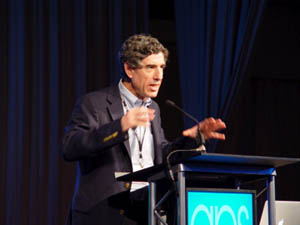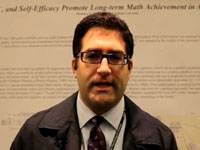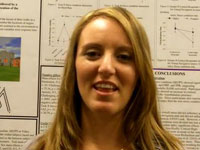Consciousness: From Neural Systems to Phenomenological Experience

Richard J. Davidson speaking at the theme program Consciousness.
Consciousness has moved to psychological science’s center stage. Advances in theory and research have transformed the field, converting what previously had been mysteries into solvable scientific problems. In this theme program, international leaders in the field displayed the progress that has been made in solving one of science’s great puzzles: how neural systems and psychological processes give rise to individual’s unified, subjective phenomenological experience.
The speakers included:
Richard J. Davidson
University of Wisconsin–Madison
Change Your Brain by Transforming Your Mind
Meditation produces changes in brain function that promote well-being, foster certain forms of positive affect and virtuous dispositions, and affect physical health and illness. Examining longitudinal research with both long-term practitioners of meditation and novices, this talk illustrated some of the key findings and challenges in the nascent field of contemplative neuroscience.
Giulio Tononi
University of Wisconsin–Madison
An Integrated Information Theory of Consciousness
Tononi discussed consciousness using the information integration theory (IIT) which posits that i) the quantity of consciousness corresponds to the amount of information generated by a complex of elements above and beyond its parts, and ii) the quality of experience is specified by the informational relationships within that complex. The IIT not only accounts for several neurobiological observations, it specifies how the quantity of consciousness can be measured as the amount of integrated information (ɸ) generated by a system.
Stanislas Dehaene
Collège de France INSERM-CEA Cognitive Neuroimaging Unit, France
Limits of Subliminal Processing and Signatures of Conscious Access
New psychological and brain-imaging experiments are pushing the limits of subliminal processing, showing for instance that naming, addition, or even executive-inhibition processes can partially operate nonconsciously. Dehaene showed that the subjective experience of conscious access to information nevertheless corresponds to a precise cognitive stage that is associated with well-defined cerebral signatures, and it supports a global neuronal workspace architecture for conscious processing.
Antonio Damasio
University of Southern California
The Neural Self
Damasio outlined his approach to the neural basis of consciousness, which focuses on the self. He identified brain regions critical for constructing tiered levels of self-processing in humans (proto self, core self, autobiographical self), giving special emphasis to particular regions of the brain stem and cerebral cortex. He discussed hypothetical mechanisms involved in the generation of different self stages at the large-scale systems level.





APS regularly opens certain online articles for discussion on our website. Effective February 2021, you must be a logged-in APS member to post comments. By posting a comment, you agree to our Community Guidelines and the display of your profile information, including your name and affiliation. Any opinions, findings, conclusions, or recommendations present in article comments are those of the writers and do not necessarily reflect the views of APS or the article’s author. For more information, please see our Community Guidelines.
Please login with your APS account to comment.